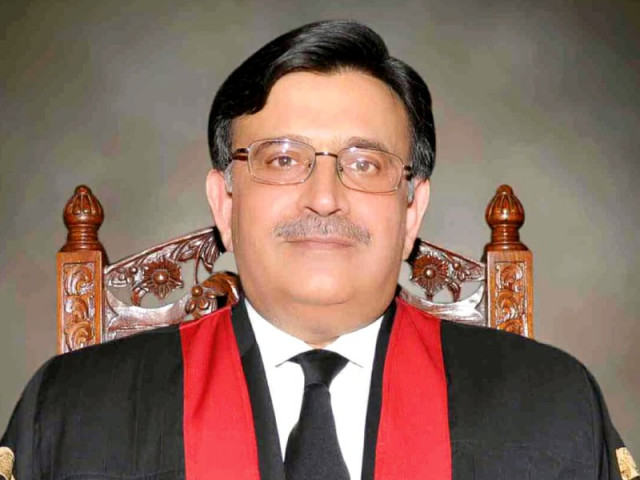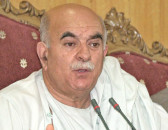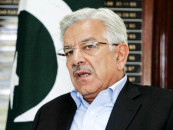Seniority principle to be major test for new CJP
Justice Bandial may consider a non-controversial lawyer for direct appointment to the SC

At a time when the air is still thick with a clamour for prioritising seniority principle for judicial appointments, the newly-appointed Chief Justice of Pakistan, Umar Ata Bandial, faces a test that his predecessor dealt with in the last year of office.
CJP Bandial’s appointment comes at a time when four judges of the apex court are to retire in the next six months. Chief Justice Gulzar Ahmed has already retired on February 1 while Justice Qazi Muhammad Amin Ahmed will be retiring on March 25.
Justice Maqbool Baqar is retiring on April 4, Justice Mazhar Alam Miankhel on July 13 and Justice Sajjad Ali Shah on August 13.
Read more: Focus of CJP-designate on population spurt
Senior lawyers believe that when the superior bars are unanimously demanding the Judicial Commission of Pakistan (JCP) to follow the seniority principle, the future appointments will be a test for new CJP who has always supported the competency factor in the appointments of SC judges.
His views were reflected in his speech during a JCP meeting on September 9, 2021, when he stated that seniority could not be the principle consideration because this was not a promotion. He had said if seniority was the criteria, then there was no need for the commission, as judges in the superior courts would then be appointed through a conveyer belt mechanism.
The last six appointments in the SC have been made without adhering to the seniority principle. Currently, Sindh High Court Chief Justice Ahmed Ali Sheikh is senior CJ high court.
Earlier, outgoing CJP Gulzar Ahmed had recommended his name as an ad-hoc judge of the apex court for one year. SHC CJ had refused to accept his ad-hoc appointment. However, he is willing to accept his permanent appointment as an SC judge.
Also read: Justice Gulzar leaves behind a mixed legacy
Legal experts say that it is unlikely that the new CJP Bandial would recommend his name due to several reasons. The same was reflected in the JCP meeting regarding the elevation of SHC junior judge Muhammad Ali Mazhar on July 28, 2021.
According to the minutes of that JCP meeting, Justice Bandial pointed out that the SHC chief justice had not written any reported judgment in the last three years because of the burden of administrative work. “The commission cannot overlook a deficiency nor relax the criteria for nominating a permanent judge to the Supreme Court,” he said.
He said the SHC chief justice deserves to be given a chance to be elevated to the SC for many reasons including the fact that he is an ethnic Sindhi. “He can focus on work here (the SC) to meet the criteria for appointment on any of three vacancies from Sindh arising in the next six months,” he said.
He also claimed that the current situation at the SHC has affected Justice Abbasi's temperament as Justice Abbasi is unhappy with the existing situation at the court.
"There were 6,000 tax cases pending in which stay orders regarding recovery of tax had exceeded six months. The SHC CJ constituted a division bench that decided those cases within a short time.
“This was disliked by Justice Abbasi, maybe rightly. However, Justice Abbasi chose to make adverse comments in court. One of our rules is that tolerance must be practised every day. However, there is no complaint about Justice Muhammad Ali Mazhar's temperament," said Justice Bandial during the JCP meeting on July 28 last year.
Senior lawyers believe that in view of his above-mentioned views, there is less chance that Justice Bandial would recommend names of SHC CJ and SHC Judge Abbasi for different reasons. However, lawyers are urging CJP Bandial that in order to avert the crisis, SHC CJ should be elevated to the SC. Otherwise, Justice Aqeel Abbasi is the best choice.
A three-judge special bench led by CJP Bandial is also hearing a petition against alleged illegal appointments of paralegal staff in the province of Sindh. The petitioner has accused SHC CJ has relaxed rules by appointing paralegal staff. However, a lawyer reveals that similar irregularities have taken place in the past. Even similar things are being witnessed in the Lahore High Court.
It is learnt that Justice Bandial may consider a non-controversial lawyer for his direct appointment to the SC.
A senior bar representative told The Express Tribune that CJP would notify the committee comprising of the commission members to review JCP rules 2010. After setting some criteria for appointments, new names will be considered by the JCP.
During the JCP meeting, Justice Maqbool Baqar had said that the issue regarding the appointment of SC judges is part of public discourse, being discussed by bars, civil society and media. “Unfortunately, we are facing a crisis. There is resentment in the bar and in the civil society in respect of the commission.”
He said that according to his assessment, the resentment was not without any basis.
“The bar is asking for structured discretionary rules giving a viable solution to the situation ... if the bar is taken on board and on the basis of their input some criteria is evolved that is workable and viable, then all the future problems according to his understanding will be resolved.”
He observed that there was a perception of packing of the courts that needed to be dispelled. Justice Baqar also said that questions are being raised Wabout our independence and our perception of independence is eroding.
Senior lawyers say that there is the issue of mistrust about judges appointments to the SC.
They say that the new CJP should address JCP members apprehensions about judges appointments. They also say that there is a need to end the perception of liking and disliking in the appointment process.



















COMMENTS
Comments are moderated and generally will be posted if they are on-topic and not abusive.
For more information, please see our Comments FAQ